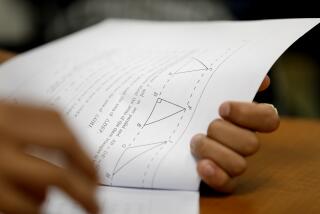D’s Can Become F’s If Parents Blow Up, New Study Indicates
- Share via
STANFORD — Dear Parents: If your kids have poor grades, don’t get angry or blame them. It may be partly your fault.
That was the advice from a Stanford University sociologist after conducting a 2-year study of 7,836 students and about 3,500 parents in six San Francisco Bay Area high schools.
Parents can worsen their child’s school performance by reacting emotionally to poor grades or by setting up rewards and punishments, said Sanford M. Dornbusch, professor of human biology and sociology.
Relationship Found
Children of parents who are authoritarian or permissive tend to have lower grades, while those whose parents are firm, encouraging and communicative have higher grades, he said.
Preliminary results from the study, which will be published next year, indicated a general relationship overall between parents’ actions and their children’s school performance.
“The linkage between parental reactions and grades was moderate in strength but very consistent for all ethnic groups and income levels,” Dornbusch said in an interview.
“Low-key, positive reinforcement, like praise and encouragement, work better than material rewards or big, exaggerated or emotional responses.”
Parents who get visibly upset by a child’s poor report card only make the situation worse, he said, because they further upset the child. That tends to result in poorer grades over time.
Creating rewards and punishments don’t work, he said. Giving children greater access to cars or letting them stay out later because of good grades leads to a poorer performance because students become less motivated toward schoolwork.
Similarly, restricting privileges because of poor grades is counterproductive. In both cases, he said, students become more concerned with the rewards and punishments than the actual schoolwork.
The only time a low-key approach is ineffective, he said, is when student grades are very low.
Responsibility Shared
“That’s when schools and parents should join together to help the child improve his grades,” he said.
Dornbusch stressed that parents should not take too much responsibility for what goes wrong with kids.
“Parents don’t live alone in the world. They should do their best, but there are other factors, other influences on the child,” he said. “Parents have a responsibility to help, but are not responsible for the results.”
More to Read
Sign up for Essential California
The most important California stories and recommendations in your inbox every morning.
You may occasionally receive promotional content from the Los Angeles Times.












